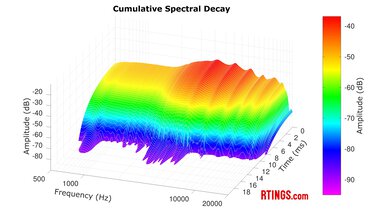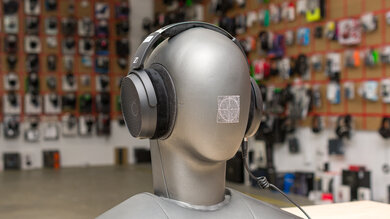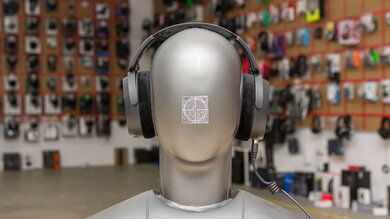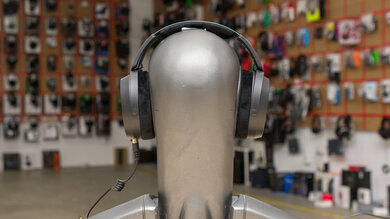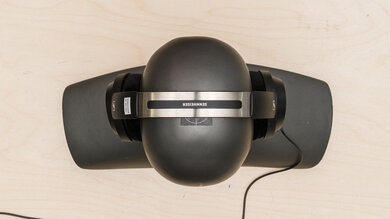The Sennheiser HD 490 PRO are open-back, over-ear headphones. While Sonova acquired Sennheiser's consumer audio division in 2022, Sennheiser have remained in charge of their pro audio division, releasing products designed for professional applications. These headphones are emblematic of this shift; they're designed as an analytical listening tool that can aid you in all manner of audio-related work. As a result, they come with two sets of earpads: one for 'Producing' and another for 'Mixing,' with the aim of making these over-ears as versatile as possible. Other useful features include a dual-jack, detachable cable design that allows for greater freedom of movement while wearing them.
Our Verdict
The Sennheiser HD490 PRO aren't well-suited for sports and fitness use. While they're lighter on the head than some open-backs and are very comfortable, they're still quite bulky and will easily fall off your head if you decide to take them on a run. Their open-back design also means their components are more susceptible to damage from sweat or moisture.
- Excellent frequency response consistency.
- Very comfortable fit.
- Leak a lot of audio.
- Terrible noise isolation.
The Sennheiser HD490 PRO are poor for commuting and travel as they're not designed for this purpose. Their bulky design makes it challenging to sling them in a backpack challenging while ensuring they're not damaged in transit. Their open-back design also means they have terrible noise isolation performance that won't provide any attenuation against engine rumble or passenger conversations while on your commute. Plus, they leak a lot of audio, so you risk bothering others in transit.
- Leak a lot of audio.
- Terrible noise isolation.
The Sennheiser HD 490 PRO are poor for office use. While they're very comfortable, they're bulky, and their open-back design provides minimal isolation against background noise in the office. They also leak a lot of audio, so if you work in a quiet office setting, others around you will likely hear your audio, even at regular listening volumes.
- Two sets of earpads to tailor the sound.
- Leak a lot of audio.
- Terrible noise isolation.
The Sennheiser HD 490 PRO are wired-only headphones; you can't use them wirelessly.
The Sennheiser HD 490 PRO are okay for wired gaming. While the slight low-bass roll-off will rob explosions of some of their intensity, the bass range is neutral enough that footsteps are rendered clearly. Their detailed mid-range helps bring out dialogue-driven cut scenes, too. Their smooth treble response ensures there are no jarring sibilant sounds. They demonstrate a degree of interaction with the outer ear that can help give cues about the perceived distance of in-game audio objects. While they offer a low-latency performance via their wired connection, you'll need a standalone mic to communicate with your teammates. Their comfortable fit makes them a solid choice for gaming marathons, too.
- Two sets of earpads to tailor the sound.
- Very comfortable fit.
- Leak a lot of audio.
- Terrible noise isolation.
The Sennheiser HD 490 PRO have great audio reproduction accuracy. They deviate very little from their balanced sound profile, and their group delay falls below the audibility threshold across the entire frequency spectrum, resulting in tight bass and transparent highs. While their L/R drivers are quite well-matched in frequency and amplitude, there's a notable phase shift in the high treble, though this will likely fall outside your hearing range. They offer a low-distortion performance across the board, regardless of listening level. While their level of pinna interaction isn't on par with the most spacious-sounding open-backs, it's not insubstantial either.
The Sennheiser HD 490 PRO are a bad choice if you're looking for headphones that can isolate you from your surroundings. Their open-back design provides very little attenuation against external noise, so external sounds will still be audible while wearing them and can interfere with these headphones' ability to reproduce audio.
The Sennheiser HD 490 PRO don't come with a built-in mic. If you want to communicate with others, you'll have to purchase a separate standalone mic.
The Sennheiser HD 490 PRO have great frequency response consistency. If you take the time to set the headphones properly, your perception of the headphones' sound signature will closely resemble our measurements. That said, you may encounter relatively minor inconsistencies in the low end if you wear glasses with the headphones.
Performance Usages
Changelog
-
Updated Aug 12, 2025:
We've updated the Wired Connection box to clarify that the cable uses a 4-pin mini XLR connection, based on user feedback.
-
Updated Jul 29, 2025:
We've updated the Sound Profile box with a link to a downloadable folder of EQ settings that will help you match these headphones' frequency response to different target curves available in our Graph Tool. We've also added a mention of the Drop + Grell OAE1 in the Compared To Other Headphones box.
-
Updated Apr 28, 2025:
We've updated the review to mention the Beyerdynamic DT 1990 PRO MKII in the Build Quality section.
-
Updated Apr 25, 2025:
This review has been updated to Test Bench 2.0, which adds the following tests: Stereo Mismatch, Group Delay, Cumulative Spectral Decay, PRTF, Harmonic Distortion, and Electrical Aspects. We've added new performance usages and updated the text throughout the Sound tests and side-by-sides.
Check Price
Differences Between Sizes And Variants
The Sennheiser HD 490 PRO come in one color variant: Black. However, you can also purchase the Sennheiser HD 490 PRO Plus. This isn't a variant per se but rather an option to buy the same headphones with an extra 9.8 ft (3 m) cable, extra padding for the headband, and a case for an additional price. You can see our unit's label.
If you encounter another variant of these headphones, let us know in the comments, and we'll update our review.
Popular Headphones Comparisons
The Sennheiser HD 490 PRO are wired open-back headphones designed for a range of pro audio applications. They have a unique swappable pad design that helps them stand out from other similarly priced audiophile headphones, as it lets you tailor the sound profile and pad material to suit different stages of the audio creation process or to accommodate different listening preferences. Their bulky frame means they're not a natural choice to soundtrack a commute or run, but if you're using them in the studio or for at-home listening, you'll appreciate their comfortable fit with the velour 'Producing ' pads.
They carry on the lineage of the Sennheiser HD 660S2, a similarly priced pair of open-backs from the same manufacturer, but the HD 490 PRO have the advantage of extra ear pads. While other competitors like the Audeze MM-100 use planar magnetic drivers, which can help create a more immersive sound, these drivers add extra weight to the frame, resulting in a less comfortable fit than the Sennheiser. They're comparable, in a sense, to the Drop + Grell OAE1 given how both of these headphones are able to output more bass than the average pair of open-backs. The Sennheiser are much more comfortable though.
If you're looking for more headphones, check out our recommendations for the best studio headphones, the best headphones for music, and the best open-back headphones.
While the Sennheiser HD 660S2 and the Sennheiser HD 490 PRO share the same manufacturer name, the latter is a product of Sennheiser's pro audio division, which translates to better performance for analytical listening. The HD 490 PRO are more comfortable, and you can even swap out their pads to change the sound profile somewhat. However, the HD 660S2 are well-built with a slightly more stable design. They also come with a case that can help you transport them on the go.
The Beyerdynamic DT 990 PRO and the Sennheiser HD 490 Pro are both open-back over-ears designed for analytical listening in the studio. While both headphones exhibit a similar degree of mismatch between the L/R drivers, the Sennheiser deliver your audio more consistently. They're also more comfortable, and you can choose between the two sets of pads provided to alter the sound profile, depending on the task at hand. The Beyerdynamic are better built, though, and their mid-range aligns more closely with our target curve, while the Sennheiser have better bass extension.
The Sennheiser HD 490 Pro and the Sennheiser HD 560S are both open-back, over-ear headphones that perform similarly. Both headphones have balanced sound profiles; the HD 490 Pro have a stronger bass response, but the HD 560S provide more detail in the mid-range, and their L/R drivers are better matched in terms of phase and amplitude. However, the HD 490 Pro have swappable pads that subtly alter the sound profile depending on what you're working on. Both are comfortable enough to wear for long periods.
While the Sennheiser HD 600 are audiophile headphones, the Sennheiser HD 490 PRO are slightly more suited to professional use in the studio. The HD 490 PRO are more comfortable, deliver audio more consistently, and can reproduce stronger bass frequencies. They also come with two different sets of earpads that you can switch between depending on the task at hand. That said, the HD 600 have a more balanced mid and treble response that matches our target very well, bringing out more detail in vocals and lead instruments. They're also built more solidly.
Test Results

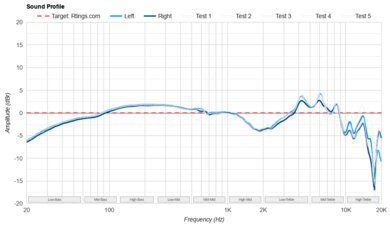
The Sennheiser HD490 come with two sets of pads designed to facilitate different professional audio applications. As a result, switching between the two sets of pads results in a different sound profile. We tested these headphones with both sets of pads, but we derived our scores from the tests carried out with the 'Producing' pads, which scored better according to our methodology.
Overall, these pads have a more pronounced bass response, while the 'Mixing' pads feature a slightly boosted mid-range that can be useful if you're trying to listen analytically. It's great to have this versatility, as the increased comfort and more exciting sound profile can be useful when arranging and building a track up from the ground. You can then turn to the 'Mixing' pads, with their underemphasized bass and boosted mids, to fine-tune your mix. With either set of pads, the headphones' sound more closely resembles the SoundGuys.com Studio Curve, one example of a target curve catered to audio professionals.
We've prepared a folder of EQ presets you can download and use to bring the sound of these headphones closer to one of the curves in our Graph Tool.
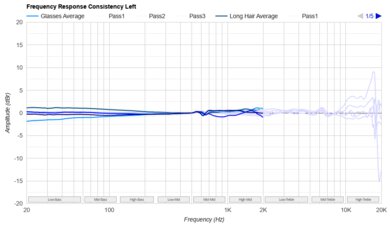
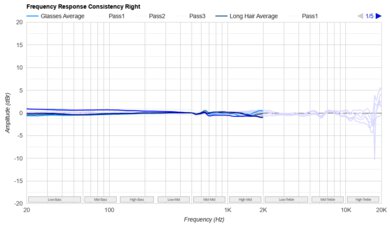
The frequency response consistency is great. Once you find a good fit, you can achieve consistent bass and treble delivery. Both sets of pads perform similarly in this regard, too, so even if you wear glasses or have thick hair, audio delivery consistency won't change if you switch out the pads.
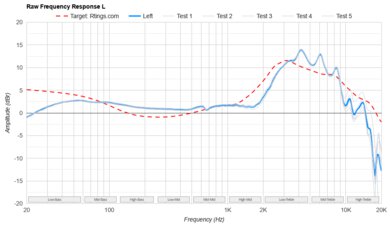
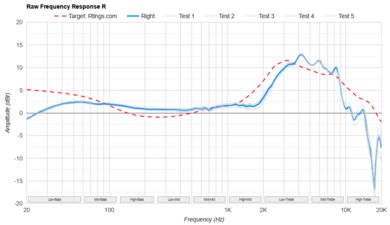
You can see a graph of the raw frequency response with the 'Mixing' pads.
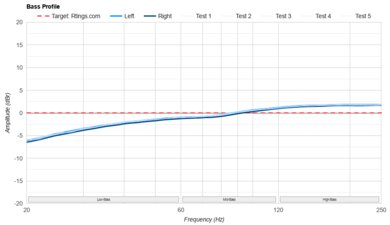
The bass target compliance is remarkable, especially for open-back headphones with dynamic drivers. While the low bass is slightly underemphasized, meaning your mixes lack low-end rumble, the rest of the range offers a healthy dose of bass. Kicks and basslines still have plenty of punch and slam for applications like sound production. On songs like Massive Attack's Teardrop, the kick sounds punchy and has a fast attack while still allowing the bassline to sound clear and prominent in the mix.
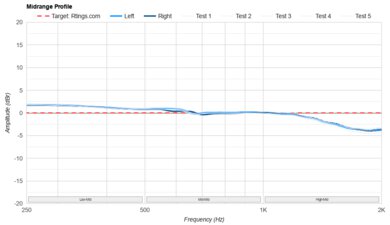
The mid-range target compliance is excellent. The response is virtually flat, though tilted to favor the low-mids, which beefs up bass instrument harmonics and rhythm guitars a bit. In the center of the mids, it's very flat for clear leads and speech. The top of the high-mid range is somewhat recessed, though, which can dull the upper harmonics of vocals and lead instruments.
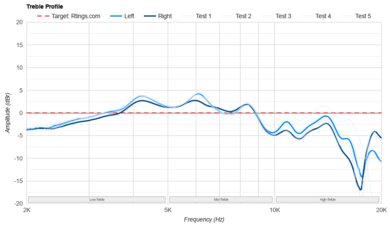
These headphones have incredible treble target compliance. While the response never deviates greatly from our target curve, there are some minor inconsistencies across the entire range. There's a dip in the low-treble range that weakens the details of vocals and lead instruments a bit. The upper frequencies of the low-treble into mid-treble response trend toward exaggeration, adding zing and attack to acoustic guitars and the bells of ride cymbals. For a warmer treble response, the 'Mixing' pads are worth consideration.
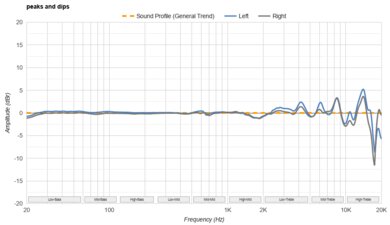
The peaks and dips performance is great, and these headphones' response doesn't deviate much from their balanced sound profile. The bass and mids are very flat up until a small dip in the high-mid and low-treble, which robs instruments and vocals of their upper harmonics of detail. A series of small peaks and dips in the low treble into the mid-treble results in sibilants that alternate between sounding a little dull and bright, depending on their pitch. Finally, a sharp peak at the top of the mid-treble adds a harsh, piercing quality to higher-pitched sibilants.
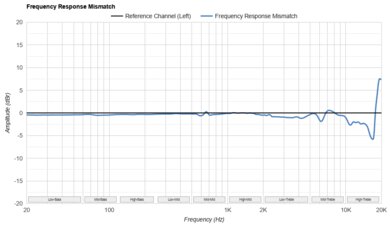
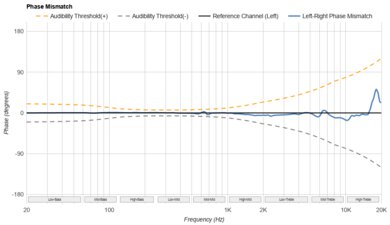
These headphones' L/R drivers are well-matched when it comes to amplitude and frequency. While the drivers sound evenly balanced when it comes to volume, there are some inconsistencies in the phase response in the high treble that impact their ability to create a perfectly even stereo image. The phase response graph doesn't showcase any major phase shifts, but it's worth noting that this is an average of three separate passes, and you can see the varying degrees of shift between the first, second, and third passes, which deviate from each other considerably in the high treble. That said, given that we lose sensitivity to this range over time, these phase response deviations aren't as heavily weighted and are more indicative of the headphone's overall acoustic properties—you're unlikely to hear any phase mismatches during everyday listening.
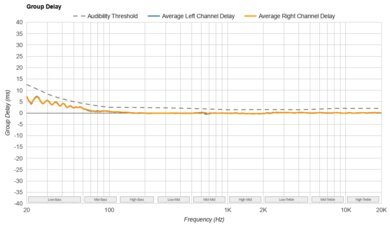
The group delay performance is great. It falls under the audibility threshold across the entire frequency spectrum, resulting in tight bass, clearly defined transients, and a transparent treble range.
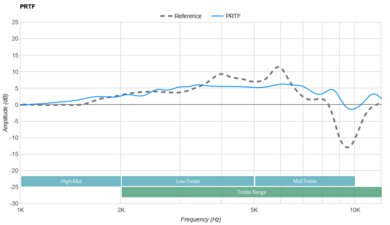
While the Sennheiser HD 490 Pro's PRTF measurements indicate a passable amount of interaction with the pinna, they still lack the qualities of an angled reference speaker. They aren't as immersive-sounding as top-of-the-line audiophile headphones like the Sennheiser HD 800 S, either, as their design doesn't facilitate audio interaction with the outer ear in quite the same way.
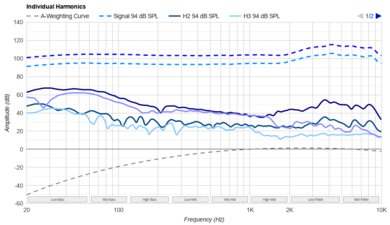
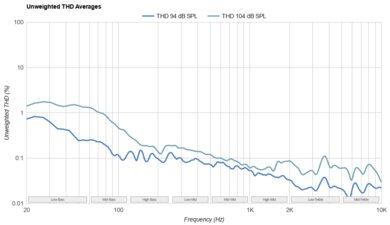
The Sennheiser HD 490 PRO have an incredible harmonic distortion performance. They can reproduce audio cleanly across the entire frequency spectrum, with no audible coloration at both 94 and 104 dB/SPL.
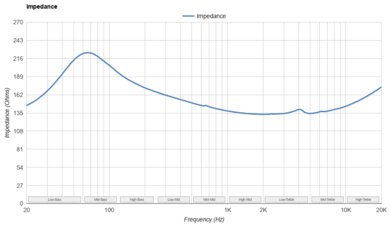
These headphones don't require an amp to drive them and can playback audio at high listening levels on mobile devices.
These are the settings used to test the Sennheiser HD490. We used the 'Producing' pads for all tests. Our results are only valid when used in this configuration.

The Sennheiser HD 490 PRO have a sleek look reminiscent of headphones in Sennheiser's consumer audio line. They have perforated metal grilles similar to those of the Sennheiser HD660S2, with glossy, black plastic yokes, ear cups that resemble the MOMENTUM series, and an adjustable padded headband. They come with two different sets of earpads. The 'Producing' pads are made of a black velvet-like material, while the 'Mixing' pads are made from a rougher, gray, cloth-like material. Their design also means you can plug in the audio cable on either ear cup, allowing greater flexibility and range of motion. They come in one color variant: 'Black.' It's also possible to pick up the 'Pro Plus' variant, which comes with additional headband padding.
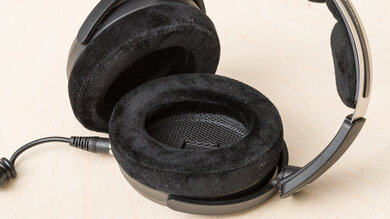
These open-backs have a very comfortable fit when using the 'Producing' pads, even if you wear glasses. The pads have a supple, velvet-like padding that feels great on the skin. While these headphones feel light on the head, they also feature soft, comfortable padding on the headband that minimizes pressure on the top of your head. The 'Mixing' pads are less comfortable but will still allow you to achieve a solid fit if you wear glasses.
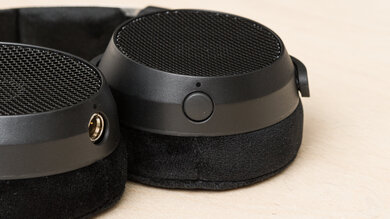

These headphones aren't particularly portable, which is normal given that the manufacturer markets them as studio headphones that aren't designed for on-the-go use. While their ear cups swivel so they can lay flat, they're still very bulky and will take up a lot of space in a bag or backpack. They also lack a case to protect them from damage while they're being transported.

These headphones have a good build quality. Although they're mostly made of plastic and look cheap at first glance, this material keeps them lightweight yet sturdy. The ear cups have a nice depth, and the two sets of washable pads seem durable enough. The 'Producing' pads are made of a soft, velvety material, while the 'Mixing' pads are constructed from a coarser, cloth-like material. The headband is also easily adjustable, with replaceable padding that provides a good amount of cushion. However, the construction is let down by flimsy plastic yokes that feel less solid than the other components. Our unit also has two screws fall out of the left hinge, but this doesn't seem to be the norm for other units. If you want a more solidly constructed, professional-oriented pair of headphones, check out the Beyerdynamic DT 1990 PRO MKII.
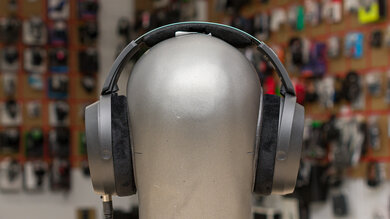
These headphones have decent stability, which will be sufficient for most studio applications. They'll easily stay on your head while you sit at the mixing console but will likely fall off and need re-adjustment if you find yourself headbanging aggressively to your latest mix.

- Sennheiser HD 490 PRO headphones
- 1/8" audio cable (1.8 m/5'9")
- 1/4" to 1/8" adapter
- 'Producing' pads (attached to the headphones)
- 'Mixing' pads
- Quick start guide and warranty information
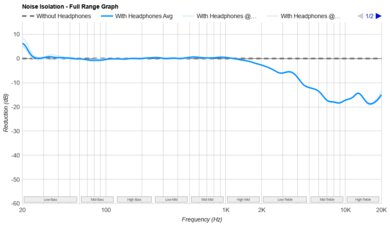
The Sennheiser HD 490 Pro's full range noise isolation performance is terrible, which is normal for open-back studio headphones. As a result, they block almost no bass or mid-range noise by virtue of their design. So if a drummer is rehearsing in the studio next door, lower-pitched elements of the kit, like the kick and snare, will make their way into your audio. They provide a slight amount of passive isolation against higher-frequency noises, like fridge hum, but it's minimal. In this case, the open-backed housings have a much greater impact on their lack of noise isolation than the ear pads, both of which isolate roughly the same amount.
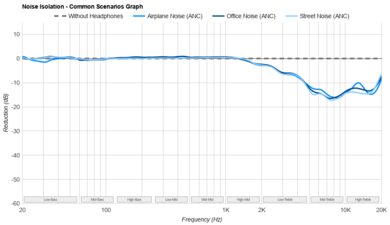
The open-backed headphones are terrible at isolating noise in common scenarios. Very high-pitched sounds are slightly muffled, but keystrokes and HVAC noises still reach your ears unimpeded.
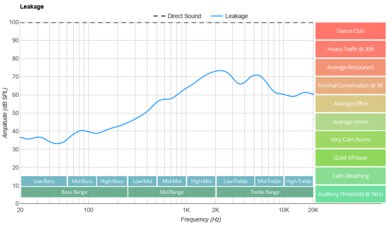
The leakage performance is terrible. While these headphones don't leak quite as much audio as other open-back models, like the Sennheiser HD 660S2, their design still means that others near you can very easily hear what you're listening to. Escaping audio is primarily concentrated in the high-mid and treble ranges, so it sounds quite tinny. If you plan to use these exclusively in a quiet studio environment, this will be fine, but if you take them on the bus or train, others around you will hear your audio at regular listening volumes.
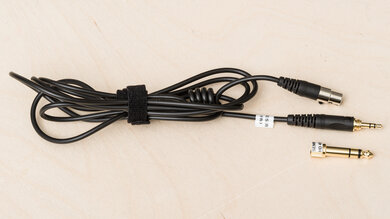
The Sennheiser HD 490 PRO come with a 1.8m (5"9') audio cable, with a 1/8" audio jack on one side and a 4-pin mini XLR on the other that plugs into the headphones. They also come with a 1/4" adapter, so you can use them with professional-end devices, like soundcards and headphone amps. Latency via analog connection is virtually non-existent; this is great if you ever need to use them for tracking instruments like synthesizers, as you won't experience any delay between your keystrokes and the audio signal.
You can connect these open-backs to your PC via their audio cable. However, you can't send audio to your PC without purchasing a standalone mic.
These headphones are compatible with PlayStation-family consoles; you can plug their cable directly into your controller. However, they don't have a mic, so you can't send audio.
These open-backs are compatible with Xbox-family consoles if you connect them to the controller's AUX port. However, you'll need a standalone mic to communicate with your teammates.

